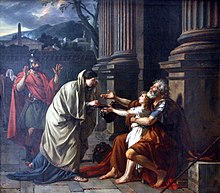Christianity and politics
Jump to navigation
Jump to search



The relationship between christianity and politics is a historically complex subject and a frequent source of disagreement throughout the history of Christianity.
Quotes[edit]
- Do not put your trust in princes,
- Civilization no longer represents the conscience of the individuals who must find therein their work. The facts and forces which now organize industry and so-called justice, violate the best instincts of mankind. ... Without regard to his conscience, the economic system involves a man in the guilt of the moral and physical death of his brothers: their blood cries to him from the adulterated and monopolized foods he eats; from the sweat-shop clothes he wears; from his educational advantages, his special privileges, his social opportunities. ... Civilization denies to man that highest of all rights — the right to live a guiltless life, the right to do right.
- George D. Herron, Between Caesar and Jesus (1899), p. 20
- The tyrant dies and his rule is over; the martyr dies and his rule begins.
- Søren Kierkegaard, Papers and Journals: A Selection, p. 352
- μάτην δὲ σέβονταί με, διδάσκοντες διδασκαλίας ἐντάλματα ἀνθρώπων.
- Μὴ γίνεσθε ἑτεροζυγοῦντες ἀπίστοις· τίς γὰρ μετοχὴ δικαιοσύνῃ καὶ ἀνομίᾳ, ἢ τίς κοινωνία φωτὶ πρὸς σκότος;
- Do not be yoked together with unbelievers. For what do righteousness and wickedness have in common? Or what fellowship can light have with darkness?
- Paul of Tarsus, 2 Corinthians 6:14 NIV
- Ὑποτάγητε πάσῃ ἀνθρωπίνῃ κτίσει διὰ τὸν Κύριον· εἴτε βασιλεῖ ὡς ὑπερέχοντι, εἴτε ἡγεμόσιν ὡς δι’ αὐτοῦ πεμπομένοις εἰς ἐκδίκησιν κακοποιῶν ἔπαινον δὲ ἀγαθοποιῶν·
- Submit yourselves for the Lord's sake to every human authority: whether to the emperor, as the supreme authority, or to governors, who are sent by him to punish those who do wrong and to commend those who do right.
- The order of authority derives from God, as the Apostle says [in Romans 13:1-7]. For this reason, the duty of obedience is, for the Christian, a consequence of this derivation of authority from God, and ceases when that ceases. But, as we have already said, authority may fail to derive from God for two reasons: either because of the way in which authority has been obtained, or in consequence of the use which is made of it. There are two ways in which the first may occur. Either because of a defect in the person, if he is unworthy; or because of some defect in the way itself by which power was acquired, if, for example, through violence, or simony or some other illegal method.
- Thomas Aquinas, Commentary on the Sentences of Peter Lombard, in Aquinas: Selected Political Writings (Basil Blackwell: 1974), p. 183
- With regard to the abuse of authority, this also may come about in two ways. First, when what is ordered by an authority is opposed to the object for which that authority was constituted (if, for example, some sinful action is commanded or one which is contrary to virtue, when it is precisely for the protection and fostering of virtue that authority is instituted). In such a case, not only is there no obligation to obey the authority, but one is obliged to disobey it, as did the holy martyrs who suffered death rather than obey the impious commands of tyrants. Secondly, when those who bear such authority command things which exceed the competence of such authority; as, for example, when a master demands payment from a servant which the latter is not bound to make, and other similar cases. In this instance the subject is free to obey or disobey.
- Thomas Aquinas, Commentary on the Sentences of Peter Lombard, in Aquinas: Selected Political Writings (Basil Blackwell: 1974), p. 183
- The gods of all pagan faiths have been allied with the rich rulers. The priests of most religions are the employees of the landowners. But the God of Israel has always claimed to be with the poor—whether in the legislation of Deuteronomy, the words of the prophets, or the experiences of the New Testament. Our God is on the side of the poor.
- John Howard Yoder, Radical Christian Discipleship (2012), p. 41
See also[edit]
- Christendom
- Christian anarchism
- Christian socialism
- Christian state
- Christianity and colonialism
- Constantinian shift
- Religion and politics
- Category:Christianity and politics
